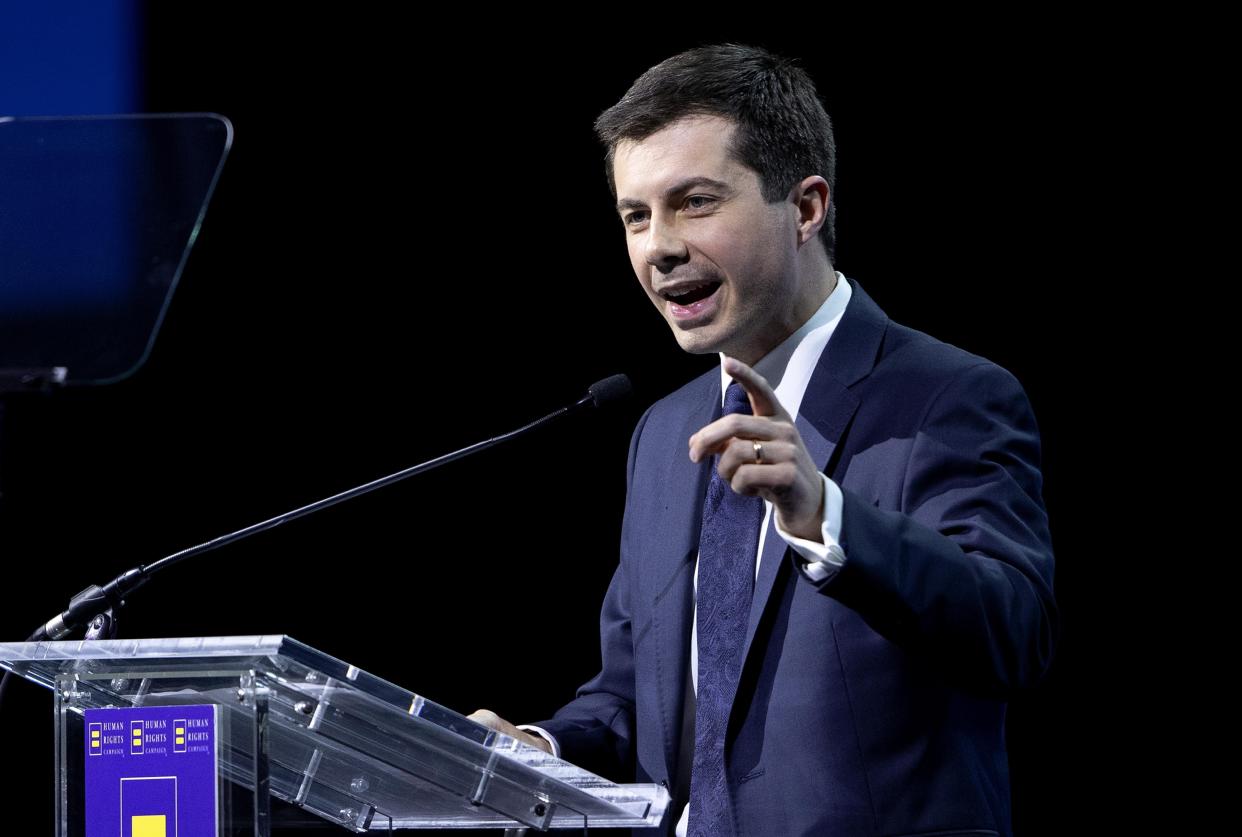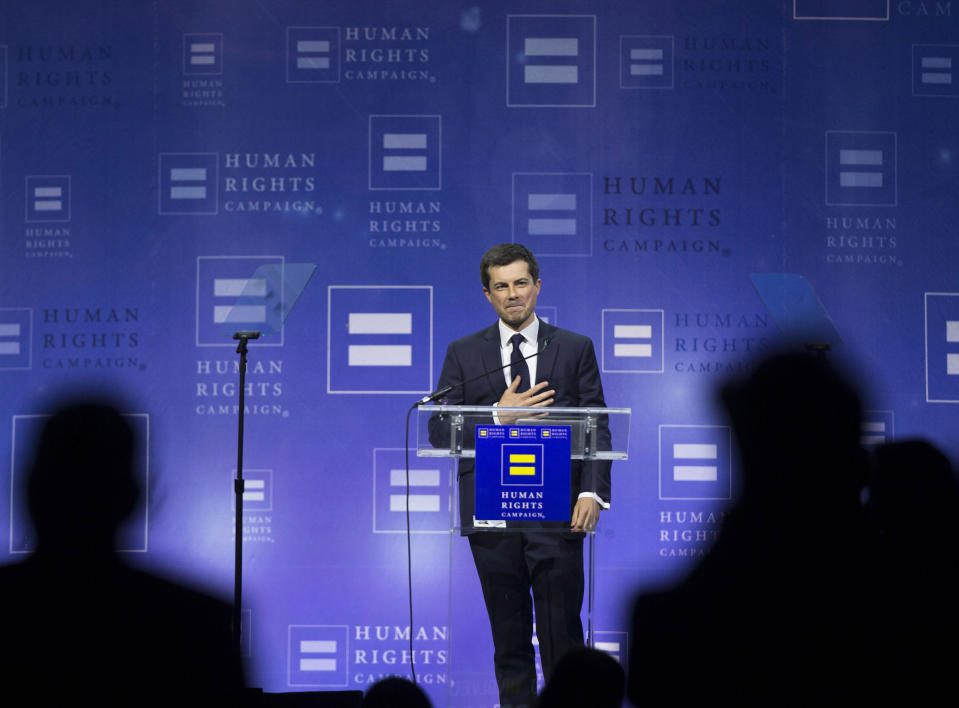Pete Buttigieg wants you to know, as a gay man, he's a minority too

Pete Buttigieg thinks he can solve the issue of identity politics in America — and his solution is Pete Buttigieg.
In a carefully crafted speech Saturday night at a Las Vegas fundraiser for lesbian, gay, bisexual and transgender causes hosted by the Human Rights Campaign, the South Bend, Ind., mayor and improbable upper-tier Democratic presidential candidate confronted head-on a nagging question that has dogged him on the trail and threatened to sidetrack his insurgent campaign: Why should the Democratic Party nominate a relatively privileged white male with a Harvard and Oxford pedigree at a moment when many on the left are pining for a woman or a person of color to lead them?
Buttigieg’s answer — one likely to define his campaign going forward — is that actually, he’s the perfect person to unite the party and help its various factions see past their differences.
Why? Because even though he’s a white man, he’s also openly gay.
“It is true that each of us can see in our own identity all the reasons we’re misunderstood and then say, ‘You don’t understand me because you haven’t walked in my shoes’ — something that is true, as far as it goes,” Buttigieg said Saturday. “But it doesn’t get us very far. Because we could also see in our identity the beginning of a new form of American solidarity.”
Early reports framed Buttigieg’s speech as a repudiation of identity politics altogether — a “risky” decision, as one NBC News report put it, to “cal[l] out fellow Democrats” for “pitting one group’s grievances against another’s” that “had echoes of Bill Clinton’s ‘Sistah Souljah moment’ in 1992, when he distanced himself from a black political activist who had made controversial comments about race.”
But the entirety of Buttigieg’s remarks make it clear that the mayor is in fact attempting something more subtle, and ultimately more risky, than a mere repudiation.
Instead, he is trying to redefine identity politics altogether — and to do so in a way that puts his own identity front and center.
Buttigieg’s argument had three parts. First, he did not dismiss the differences between key Democratic constituencies; he embraced them. Second, he declared that while these differences are real, they’re also subordinate to a larger, shared experience of exclusion. And third, he claimed that as America’s first openly gay Democratic presidential candidate, he would be just as worthy a champion for excluded Americans as any of his minority or female rivals — notwithstanding his race, gender and privileged background.
Throughout his remarks, Buttigieg was explicit: identity matters, especially among the marginalized.
“I’m not talking about pretending that there are equivalencies between the different patterns of exclusion in this country,” he explained. “I may be a part of the LGBTQ community, but being a gay man doesn’t even tell me what it’s like to be a trans woman of color in that same community — let alone an undocumented mother of four, or a disabled veteran or a displaced auto worker.”

He went on to lament that “black women are dying from maternal complications at triple the rate of white women”; that “Dreamer[s]” are “putting [themselves] through college without a path to citizenship”; that “disabled person[s are] discriminated against in employment opportunities”; that “autoworker[s] 12 years into their career [are] no longer sure how to provide for their family.”
But Buttigieg also criticized those who use identity as a tool of division — not just in the Trump administration, which “has mastered the practice of the most divisive form of such politics, which is white identity,” but on the left as well, where “these divisive lines of thinking have even entered into the consciousness of my own party.”
“The wall I worry about most isn’t the president’s fantasy wall on the Mexican border that’s never going to get built anyway,” Buttigieg continued. “What I worry about are the very real walls being put up between us as we get divided and carved up — walls going up within the working class, within communities, even within families.”
The antidote, Buttigieg said, was solidarity: for “anyone who has been marginalized or preyed upon or counted out” to “rise together to meet this moment” — to join forces as “a bigger ‘us,’ without pretending we’re all the same, without needing to all be the same, in order to put it all on the line for one another.”
And who better to lead such a coalition, Buttigieg concluded, than a gay person — someone who, “ten years ago, the first day [he] set foot on a Navy base… could not have served openly in uniform,” and whose marriage “could not have existed” just “five years ago in [his] home state?”
“The more you know about exclusion, the more you think about belonging — and we have a crisis of belonging in this country,” the mayor said. “What every gay person has in common with every excluded person of any kind is knowing what it’s like to see a wall between you and the rest of the world, and wonder what it’s like on the other side.”
It remains to be seen whether Buttigieg’s nuanced strategy — his attempt to transcend identity politics by embracing identity itself — is enough to silence critics and persuade skeptics.
Though Buttigieg vowed to “to fight for a fairer criminal justice system, even if no one in [his] immediate family has experienced the racial inequity in that broken system,” and to “fight for the Central American asylum seeker looking for a better life” for “the same reason” he “fight[s] for transgender troops,” it may be that women or minority voters who otherwise share his values nonetheless choose to support candidates, such as Elizabeth Warren or Kamala Harris or Cory Booker or Julián Castro, who have more directly shared their struggles.
It may be that such voters scrutinize Buttigieg’s elite background and his record as mayor of South Bend and see in him someone who instinctively identifies more with the forces of gentrification than with the communities of color those forces tend to displace.
Or it may be that some Democrats, worried about losing again to Donald Trump, decide that America isn’t ready to elect a gay president. (Opinion polls show that while a solid majority of Americans — 70 percent, including 46 percent of Republicans — say they aren’t bothered by the idea, most think the country as a whole won’t care for the idea of a president dancing with his husband at the inaugural ball.)

Yet Buttigieg is betting otherwise. “The struggle for freedom and fairness and a better life reaches far beyond our LGBTQ experience, but our experience arms us with empathy and it fills us with the energy to get this done,” he said Saturday. “Which is why what I have to say to a woman who will simply not stand for the 46th male president in a row, or a voter of color who is getting tired of politicians, Republican and Democratic, making promises they can’t keep to their community and has decided their trust will be harder than ever to win this time around — that as much as I hope you will decide to be for me, if you don’t, I am still absolutely committed to being for you.”
In that, Buttigieg may be following less in the footsteps of Bill Clinton, a fellow white man who criticized a black rapper in order to reassure other whites, than of his more recent Democratic predecessor, Barack Obama. On March 8, 2008, in the midst of a firestorm over fierce sermons many deemed anti-American delivered by his pastor, Rev. Jeremiah Wright, Obama gave a speech designed not only to distance himself from Wright — he had already repeatedly condemned Wright’s comments — but to contextualize long-simmering black “anger” at racial injustice. He then juxtaposed it with white “resentment” and argued that as the son of a black Kenyan and a white Kansan, he alone among the candidates could help America transcend its “racial stalemate” and tackle its common problems.
Much like Obama, Buttigieg’s identity is twofold. Outwardly he is a white man — the personification of privilege. Yet he is also gay. Obama’s challenge was convincing white Americans that he identified with them, despite the color of his skin; Buttigieg has to convince the other half of his party of the same thing. It is a sign of the times, and a test of his skill, that his candidacy may sink or swim on his ability to sell an attribute that would have been disqualifying just a few short years ago — his sexuality — as the very thing that makes him most relatable.
“Being gay, just like every other fact about me … means that I have a story, and if I look to that story I can find the building blocks not only for empathy, but for the impetus to action,” Buttigieg said Saturday. “I am not just like you. No two of us are alike. But each of us has a story that can either separate us or connect us.”
_____
Read more from Yahoo News:




